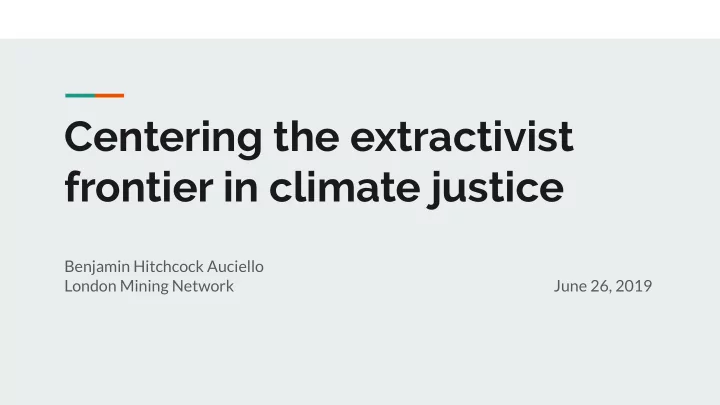

Centering the extractivist frontier in climate justice Benjamin Hitchcock Auciello London Mining Network June 26, 2019
Defining terms Extractivism: high-intensity, (typically) export-oriented extraction of common ecological goods rooted in colonialism and the notion that humans are separate from, and superior to, the rest of the living world. Climate Justice: an approach that centres the systemic, root causes of the climate crisis, often understood as the intersection of dominant power relations.
1. Climate justice, just(ice) transition Locates the report’s contributions within the much broader struggle for climate and environmental justice Explains the reasoning for the report’s focus on mining and Emphasizes the social dimension of energy transitions historically
2. Extractivism in the decades to come Discusses projections for total resource extraction over the next four decades Raises concerns about the interconnected ecological impacts of increased resource extraction Highlights the systemic challenges (declining ore grade, EROI, tailings facilities) that will likely exacerbate the already devastating impacts of metal mining in particular
3. The Transition-Mining Nexus Examines peer-reviewed supply and demand projections for ‘critical metals’ Highlights the share of critical metal end-uses that renewable energy technologies account for amongst total end-uses This section places in perspective the relative significance of renewable energy technologies in driving critical metal demand
4. Greenwashing, political will, investment trends Exposes how the mining industry is attracting investment and justifying new projects by citing projected critical metals demand and framing itself as a key actor in the transition New narratives emerging… WEF Global Battery Alliance, WB Climate-Smart Mining, and even ‘progressive’ governments are repackaging old narratives to promote and justify new mining projects
5. Situating the nexus in communities, ecosystems Illustrates some of the social and ecological impacts of critical metal mining through brief case studies of mining-affected communities (copper, silver, lithium, cobalt, REEs and deep sea) Highlights the risks that the expanding extractive frontier poses to life, water and territory around the world
6. Beyond extractivism for a just(ice) transition Points to alternative strategies for material procurement from secondary sources in an attempt to reduce primary demand Highlights the need to support affected communities , who often at great risk, are resisting new mining efforts around the world Calls into question the gospel of ‘eco-efficiency’ and the role of GDP growth in the Global North and acknowledges the need to embrace a plurality of value systems and world views
Annex: Recommendations Seeks to highlight emblematic ‘non-reformist reforms’ that can be translated into policy and used in advocacy spaces… Empowering communities, holding companies to account: Binding treaty on TNCs and HR, right to say no to mining, fighting ISDS Internalising externalities: manufacturer end of life responsibility directives, rigorous legislation on tailings, water and mine closure
Acknowledgements Big thanks to London Mining Network (Richard, Steph, Lydia and Terry) To the advisory group members (Hal, Diana, Whit and Seb) To other researchers (notably, the UTS-ISF report prepared for Earthworks) All others who have commented, offered support and feedback And above all, to those on the frontlines
Recommend
More recommend